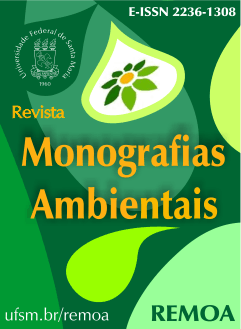Compatibility of architectural, structural and health design: A theoretical approach and a case study
DOI:
https://doi.org/10.5902/2236130812787Keywords:
Compatibility, Project Management, Importance of projectsAbstract
The urgent need for the valuation of the project activity and project management has been highlighted in the context of new developments and dynamics that construction has been taking the country . When the project activity and relegated to the background errors and pathology in buildings are indicative of the need for compatibility of projects in order to mitigate the high levels of rework and waste . Although many advances in tools that enable compatibility between projects , are still considerable difficulties that some companies have to adopt , by financial factors or are unaware of the importance of project management . In order to present the issues addressed in this monograph , literature searches were used in the works of several scholars and researchers that address the importance of compatibility of projects . A case study , where they were evaluated and demonstrated interferences between architectural design and structure with other complementary projects was also presented . Were detected during the reconciliation accomplished that projects had several interferences between them which certainly would provoke various unplanned rework and decisions that would be taken during the execution of the work in order to repair the various interferences due to lack of compatibility.
Downloads
References
GRAZIANO, F. P. Compatibilização de projetos. Instituto de Pesquisas tecnológicas – IPT (Mestrado Profissionalizante), São Paulo, 2003.
MELHADO, S. B. O Processo de Projeto no Contexto da Busca de Competitividade. In. Anais do Seminário Internacional - Gestão e Tecnologia na Produção de Edifícios. São Paulo, EPUSP/PCC,
, p. 7-51.
MELHADO, S.B. Qualidade do projeto na construção de edifícios: aplicação ao caso das empresas de incorporação e construção. São Paulo: Tese – escola Politécnica da Universidade de São Paulo, 1994.
MIKALDO JR, Jorge, SCHEER, Sergio. Compatibilização ou Engenharia Simultânea: Qual é a melhor solução. 2008. Tese (Mestrado Profissionalizante) – Universidade Federal do Paraná.
MIKALDO JUNIOR, Jorge. Estudo comparativo do processo de compatibilização de projetos em
D e 3D com uso de TI. 2006. Dissertação (Mestrado Profissionalizante) - Universidade Federal do
Paraná.
NOVAES, Celso Carlos. Ações para controle e garantia da qualidade de projetos na construção de
edifícios. I WORKSHOP NACIONAL DE GESTÃO DO PROCESSO DE PROJETO NA CONSTRUÇÃO DE EDIFÍCIO, 1998, SÃO CARLOS, BRASIL, 1998, 1998. 5 p.,II.
Downloads
Published
How to Cite
Issue
Section
License
Ethical guidelines for journal publication
The REMOA is committed to ensuring ethics in publication and quality of articles.
Conformance to standards of ethical behavior is therefore expected of all parties involved: Authors, Editors, Reviewers, and the Publisher.
In particular,
Authors: Authors should present an objective discussion of the significance of research work as well as sufficient detail and references to permit others to replicate the experiments. Fraudulent or knowingly inaccurate statements constitute unethical behavior and are unacceptable. Review articles should also be objective, comprehensive, and accurate accounts of the state of the art. The authors should ensure that their work is entirely original works, and if the work and/or words of others have been used, this has been appropriately acknowledged. Plagiarism in all its forms constitutes unethical publishing behavior and is unacceptable. Submitting the same manuscript to more than one journal concurrently constitutes unethical publishing behavior and is unacceptable. Authors should not submit articles describing essentially the same research to more than one journal. The corresponding author should ensure that there is a full consensus of all co-authors in approving the final version of the paper and its submission for publication.
Editors: Editors should evaluate manuscripts exclusively on the basis of their academic merit. An editor must not use unpublished information in the editor's own research without the express written consent of the author. Editors should take reasonable responsive measures when ethical complaints have been presented concerning a submitted manuscript or published paper.
Reviewers: Any manuscripts received for review must be treated as confidential documents. Privileged information or ideas obtained through peer review must be kept confidential and not used for personal advantage. Reviews should be conducted objectively, and observations should be formulated clearly with supporting arguments, so that authors can use them for improving the paper. Any selected referee who feels unqualified to review the research reported in a manuscript or knows that its prompt review will be impossible should notify the editor and excuse himself from the review process. Reviewers should not consider manuscripts in which they have conflicts of interest resulting from competitive, collaborative, or other relationships or connections with any of the authors, companies, or institutions connected to the papers.






